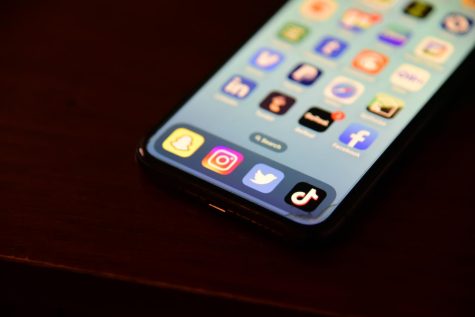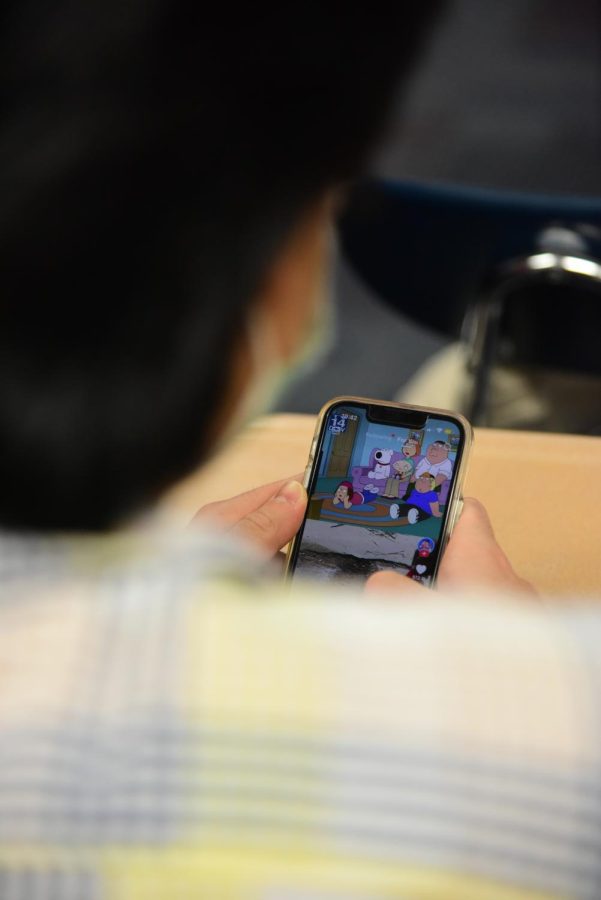Senior Eric Yang spends a lot of time on TikTok. However, though he said he enjoys being on social media, he also believes it can be harmful.
“I believe (social media is) a very inevitable thing that was going to happen with the development of the Internet, so there’s really no way to combat it,” he said, “but I feel like a lot of people take it as something that should be inherent in their lives…and I don’t think that’s the way we should view it. It’s become too big of a part in our lives.”
Andrew Weaver, associate professor at Indiana University’s Media School, focuses on media psychology, which he defines as the study of the attitudes, emotions and motivations of people in the context of media content. Weaver said he agrees with Yang that social media has taken over a large part of people’s interactions with others.
“I think one thing we see in the research on social media…is that often there’s a mismatch in the social needs that we have and then the gratification effects that we’re getting from social media,” Weaver said. “For example, if you look at something like loneliness. One thing that repeatedly comes up in the studies is that people who are feeling lonely tend to use more social media, but social media use makes them feel more lonely or isolated.”
Yang said he believes social media skews the way people present themselves.
“It’s changed the way we socialize with other people to an extent that I don’t really like because it pushes people to present themselves in ways that are—not dishonest, because if you want to say ‘honest’ you have to imply that there’s some sort of intention there. But for a lot of people, I feel like (social media), even subconsciously, it leads them to frame their lives or depict themselves in a way that isn’t accurate to who they really are,” he said.
Yang also said he believes social media’s ability to facilitate rapid communication can be harmful.

“(Social media) literally lets you access these interpersonal relationships at any time of the day, whenever you want, wherever you want,” Yang said. “But at the same time, I think it leads to—I don’t want to say too much, because you can have as many friends or…interpersonal relationships as you want. But it’s because of that, I don’t see as much depth with relationships between people.”
Senior Somayeh Gambles said she believes the disconnect between people created on social media makes it easier for conflict and misinformation to spread.
“Things get twisted easily, especially when it’s just looking at writing, at text and someone’s not actually saying it to you. I think social media makes things hard to understand… It’s just so easy to misinterpret,” Gambles said. “I just feel like you can’t always know and sometimes things can come across differently and I feel like that’s how different things get spread.”
Yang said he agrees with Gambles. Specifically, Yang said he believes social media can normalize racism. For example, Yang said he has seen a video of John Cena speaking Mandarin, a video which began as a meme but has grown to become a racist joke.
“In TikTok comment sections, where you just see an Asian person and it’s completely unrelated to John Cena or even ice cream, you see people just saying that stuff,” he said. “I don’t think a lot of these people see it as racism, I’m sure they don’t, but what it ends up being is racism because you’re—first of all, making fun of another culture’s language, right? And then you’re also, in a sense, stereotyping because you see an Asian person, you just say that. It’s not good. I think that ends up leading to desensitization to what can be racism or precursors to racism. You see a lot of people talking about how this is okay, it’s just a joke. It’s really not because, like I said, it desensitizes people.”
Weaver said social media can set harmful standards for appropriate and inappropriate behavior.
“When you talk about social aggression, though, that’s where I think there’s some problematic issues with social media or at least certain parts of the social media landscape. That really has to do, I think, with some of the norms that get set about what’s appropriate behavior,” Weaver said. “If you’re on Twitter and a lot of the people that you follow engage in verbal attacks and social aggression, then that becomes more normalized and the person is more likely to engage in it themselves. It’s a cycle that sort of perpetuates itself.”
This is the first of three parts for this story on the impact of social media. The second part will center around the effects of seeing violence on social media platforms. Read the second part here on Jan. 26.

































![AI in films like "The Brutalist" is convenient, but shouldn’t take priority [opinion]](https://hilite.org/wp-content/uploads/2025/02/catherine-cover-1200x471.jpg)









































![Review: “The Immortal Soul Salvage Yard:” A criminally underrated poetry collection [MUSE]](https://hilite.org/wp-content/uploads/2025/03/71cju6TvqmL._AC_UF10001000_QL80_.jpg)
![Review: "Dog Man" is Unapologetically Chaotic [MUSE]](https://hilite.org/wp-content/uploads/2025/03/dogman-1200x700.jpg)
![Review: "Ne Zha 2": The WeChat family reunion I didn’t know I needed [MUSE]](https://hilite.org/wp-content/uploads/2025/03/unnamed-4.png)
![Review in Print: Maripaz Villar brings a delightfully unique style to the world of WEBTOON [MUSE]](https://hilite.org/wp-content/uploads/2023/12/maripazcover-1200x960.jpg)
![Review: “The Sword of Kaigen” is a masterpiece [MUSE]](https://hilite.org/wp-content/uploads/2023/11/Screenshot-2023-11-26-201051.png)
![Review: Gateron Oil Kings, great linear switches, okay price [MUSE]](https://hilite.org/wp-content/uploads/2023/11/Screenshot-2023-11-26-200553.png)
![Review: “A Haunting in Venice” is a significant improvement from other Agatha Christie adaptations [MUSE]](https://hilite.org/wp-content/uploads/2023/11/e7ee2938a6d422669771bce6d8088521.jpg)
![Review: A Thanksgiving story from elementary school, still just as interesting [MUSE]](https://hilite.org/wp-content/uploads/2023/11/Screenshot-2023-11-26-195514-987x1200.png)
![Review: "When I Fly Towards You", cute, uplifting youth drama [MUSE]](https://hilite.org/wp-content/uploads/2023/09/When-I-Fly-Towards-You-Chinese-drama.png)
![Postcards from Muse: Hawaii Travel Diary [MUSE]](https://hilite.org/wp-content/uploads/2023/09/My-project-1-1200x1200.jpg)
![Review: "Ladybug & Cat Noir: The Movie," departure from original show [MUSE]](https://hilite.org/wp-content/uploads/2023/09/Ladybug__Cat_Noir_-_The_Movie_poster.jpg)
![Review in Print: "Hidden Love" is the cute, uplifting drama everyone needs [MUSE]](https://hilite.org/wp-content/uploads/2023/09/hiddenlovecover-e1693597208225-1030x1200.png)
![Review in Print: "Heartstopper" is the heartwarming queer romance we all need [MUSE]](https://hilite.org/wp-content/uploads/2023/08/museheartstoppercover-1200x654.png)




